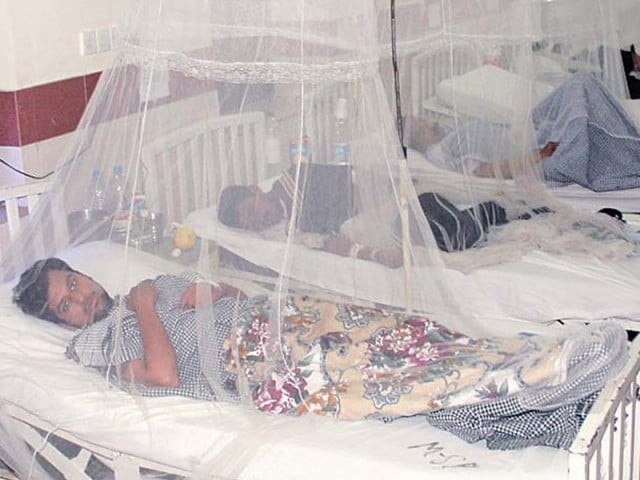Reservoirs for mosquitoes: Most dengue cases reported from District South
Swimming pools, nurseries, ponds and excessive air-conditioning create breeding grounds

PHOTO: FILE
Most cases of dengue fever are being reported from the city's most affluent area, District South, according to the Dengue Prevention and Control Programme (DPCP).
"It is being observed for the last year that more cases are reported from this particular district," said Dr Masood Ahmed Solangi, the head of DPCP.
District South comprises Defence Housing Authority (DHA), Clifton, parts of Saddar, Lyari and Keamari towns. The posh neighbourhoods of DHA and Clifton are breeding grounds for dengue mosquitoes leading to a rise in the number of people suffering from dengue fever.
Anti-dengue drive: Minister for complete eradication of epidemic
Swimming pools, nurseries, home gardens and pools of water under air-conditioners are some common bodies of stagnant water that breed dengue mosquitoes.
Dr Solangi pointed out that the waste water created by air-conditioners is not disposed of regularly. "Same is the case with swimming pools," he added. Stored water in such forms creates safe reservoirs for dengue mosquitoes.
The DPCP has approached the management of hotels and clubs to change their water regularly but their requests are hardly followed, complained Dr Solangi.
After South, District East — comprising Gulshan and Jamshed towns — also has a high number of dengue cases, shared Dr Solangi, adding that the lowest number of cases are reported from District Malir. "It is an urban-centric disease," he explained, adding that even the cases reported in other parts of the province were mostly affected in Karachi.
Mosquito alert: Health Dept issues dengue alert
Other side of the bridge
Those parts of District South, which are not graced with wide streets and less piles of garbage, are suffering much like the rest of the city. Densely populated neighbourhoods of Saddar, Kharadar and Lyari lack proper sanitation facilities. "Residential areas are not cleaned properly," complained a Saddar resident, Naveed. "This is not a new issue. We have been facing this since childhood," he added. "Just go to posh areas and compare [them with the] kind of environment we are given."
Salman Khatri, a resident of Lyari's Lea Market, also pointed at garbage piles in the area. "I don't remember any fumigation [taking place] recently," he said, adding that people usually just kill the mosquitoes with their hands.
The local hospital records confirm that these areas are also breeding dengue mosquitoes. "Our special ward for such patients is always full," said Dr Abdul Aziz Soomro, who was until recently working at Lyari General Hospital. As the head of the hospital for more than two years, Dr Soomro observed that, not only sanitation issues, but pathetic sewerage system, neglected, and overpopulated areas in District South multiply the chances of seasonal diseases. "The citizens in this particular area need awareness sessions on health-related issues," he suggested.
Even the local administration, which is responsible for conducting fumigation drives, admits to lingering sanitation problems. "Sanitation issues exist in parts of District South and [poor] sewerage is also a major problem," said Nisar Ahmed Soomro, the administrator of district (South) municipal corporation.
"There is an acute shortage of sanitary workers," he explained, adding that there was a ban on hiring and even when the government tries to hire them, it never hires the numbers they need. "The shortage of sanitary workers doesn't exist in my district alone but across the city," he added.
He pointed out, however, that the municipal authorities carry out monthly sprays to kill mosquitoes.
Drive against dengue
In a first, the DPCP has recently hired two entomologists from the malaria programme, who will launch an anti-dengue drive in various parts of the city next week. In this larvicidal drive, the authorities will target the dengue mosquitoes in the larvae stages, said a health department official, adding that the drive will begin from District East.
Moreover, the DPCP also plans to launch a mass awareness campaign in the city from March 22. It hopes to help the people understand their role in controlling the dengue mosquitoes and fever.
Published in The Express Tribune, March 13th, 2016.



















COMMENTS
Comments are moderated and generally will be posted if they are on-topic and not abusive.
For more information, please see our Comments FAQ